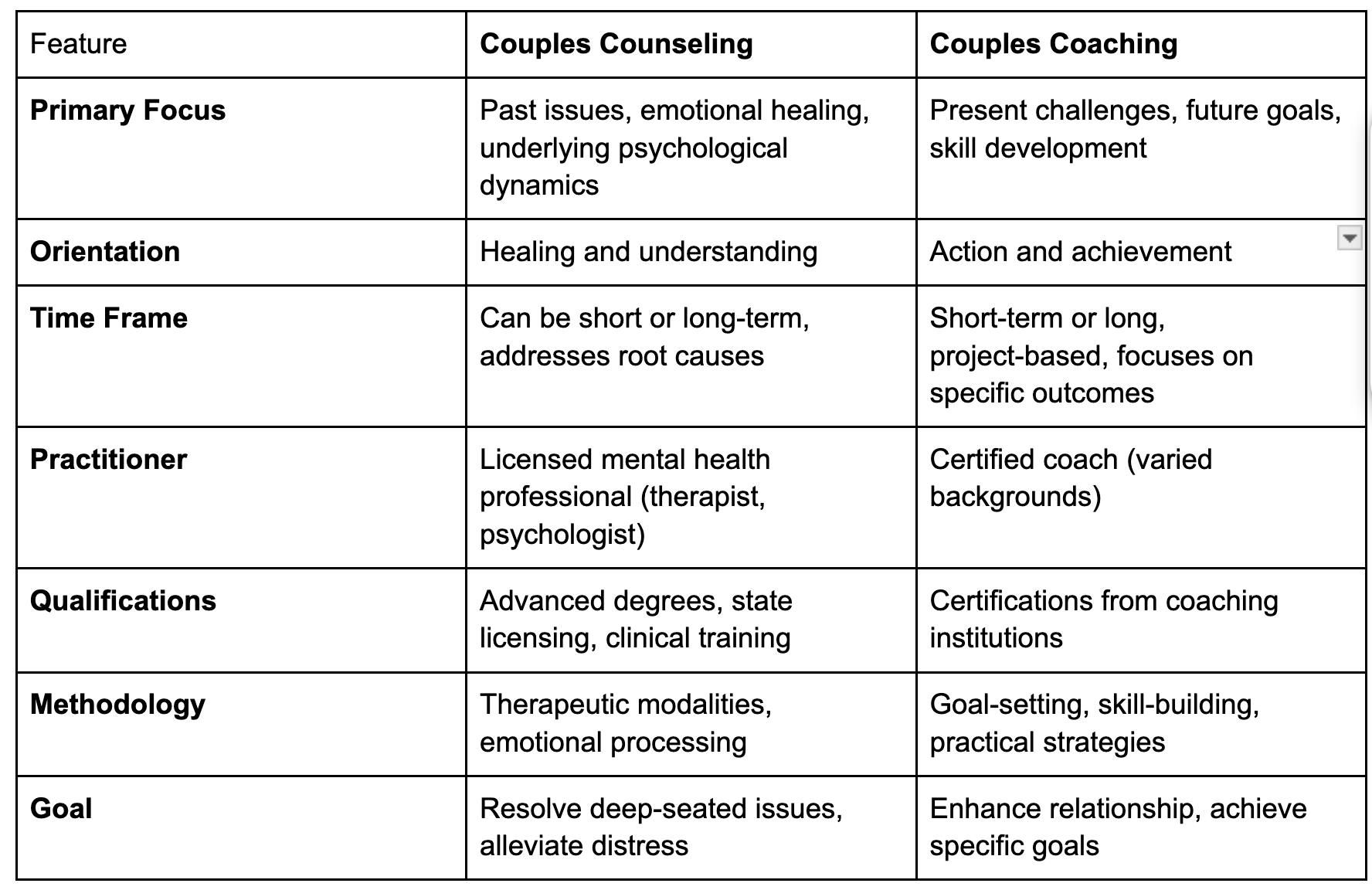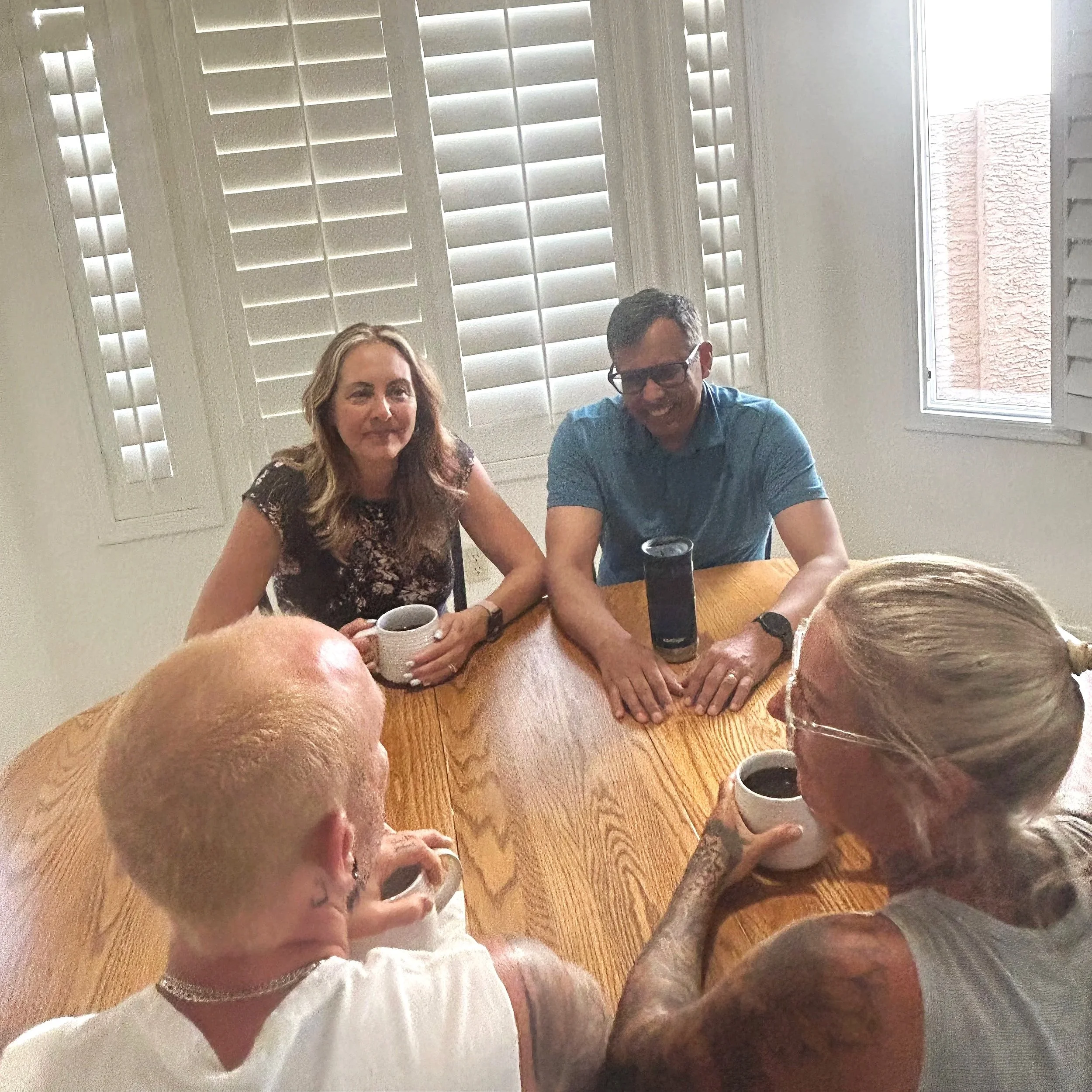Relationship Coaching vs. Couples Counseling: Understanding the Differences
Relationships are complex, and navigating their challenges often requires external support. When facing difficulties, couples might seek help through either couples coaching or couples counseling. While both aim to improve relationship health, they differ significantly in their approach, focus, and methodology. Understanding these distinctions can help couples choose the most suitable path for their unique needs.
At SMM Coaching & Consulting, we guide couples to ensure they are seen, heard, and valued through SafeConversation strategies.
“Research consistently shows that communication issues are a primary factor in divorce, with one study finding it was the main reason in 67.5% of marriages that ended.”
Relationship Coaching: Forward-Looking and Action-Oriented
Relationship coaching, in contrast, is typically a future-focused, action-oriented process designed to help couples achieve specific relationship goals. Coaches work with couples to identify their strengths, clarify their vision for the relationship, and develop practical strategies to overcome current obstacles and build a more fulfilling future.
Key Characteristics of Relationship Coaching:
Focus: Centers on present challenges and future aspirations. It's about skill-building, goal-setting, and creating actionable steps to improve communication, conflict resolution, intimacy, and overall relationship satisfaction.
Approach: Emphasizes strengths, potential, and taking responsibility for creating desired outcomes. It's less about "why" things are happening and more about "how" to move forward effectively.
Duration: Often short-term or project-based, with a clear focus on achieving defined objectives within a specific timeframe. Sessions can be less frequent as couples implement strategies between meetings.
Qualifications: We are seasoned coaches with several years of experience, SafeConversations certified, and experience in the healthcare industry.
Confidentiality: While coaches maintain client confidentiality, the ethical and legal frameworks differ from those governing licensed therapists.
Exercises: Utilizes tools such as active listening, goal-setting exercises, communication skill-building, conflict resolution techniques, and accountability frameworks.
When to Consider Relationship Coaching:
Relationship coaching is often an excellent choice when:
Couples are generally healthy but want to enhance specific areas of their relationship.
They are seeking to improve communication, deepen intimacy, or better manage daily stressors.
They want to set clear relationship goals and develop strategies to achieve them.
They are going through a life transition (e.g., marriage, parenthood, career change) and want to proactively strengthen their partnership.
They are looking for practical tools and strategies to implement immediately.
A Comparative Overview
To further clarify the distinctions, here's a comparative table:
Couples Counseling: Healing the Past, Understanding the Present
Couples counseling, often referred to as therapy, typically delves into the past to understand the roots of current relational patterns and emotional distress. It's a therapeutic process led by licensed mental health professionals such as psychologists, therapists, or social workers.
Key Characteristics of Couples Counseling:
Focus: Primarily addresses underlying psychological issues, past traumas, mental health conditions (e.g., depression, anxiety, addiction), and deeply ingrained dysfunctional communication patterns that are often linked to past experiences.
Approach: Explores emotions, past experiences, and unconscious dynamics that influence present behavior. It often involves processing difficult emotions, healing old wounds, and developing coping mechanisms for mental health challenges within the relationship context.
Duration: Can be short-term or long-term, depending on the complexity of the issues. It often involves consistent, regular sessions over an extended period.
Qualifications: Practitioners are typically licensed professionals with advanced degrees (Master's or Doctorate) in fields like psychology, social work, or marriage and family therapy. They are trained to diagnose and treat mental health disorders.
Confidentiality: Sessions are confidential, and therapists adhere to strict ethical guidelines and legal requirements regarding patient privacy.
Interventions: May include cognitive-behavioral therapy (CBT), emotionally focused therapy (EFT), psychodynamic therapy, and other evidence-based therapeutic modalities.
When to Consider Couples Counseling:
Couples counseling is particularly beneficial when:
There are deep-seated issues, unresolved conflicts, or recurring negative patterns.
One or both partners are dealing with individual mental health challenges that impact the relationship.
There's been infidelity, significant betrayal, or trauma within the relationship.
Communication has completely broken down, leading to persistent anger, resentment, or emotional distance.
Couples are contemplating separation or divorce and need support in navigating this process.
Choosing the Right Path for You
The decision between relationship coaching and couples counseling depends largely on the nature of the challenges you're facing and your desired outcomes.
Couples Counseling: If your relationship is in significant distress, marked by persistent conflict, emotional pain, or underlying mental health issues, couples counseling is likely the more appropriate choice. A licensed therapist can provide the necessary clinical expertise to address complex psychological dynamics and facilitate deeper healing.
Relationship Coaching: If your relationship is generally sound but you're looking to enhance specific areas, improve communication, set new goals, or navigate a transition more effectively, relationship coaching can provide valuable tools and support. A coach can help you build on your strengths and proactively create the relationship you desire.
It's also possible to engage in both at different times or even concurrently, depending on your needs. For instance, a couple might complete a course of counseling to address past trauma and then engage a coach to refine their communication skills and set future goals.
Ultimately, both couples coaching and couples counseling offer valuable support for relationships. Have questions about relationship coaching? Book a complimentary coaching session with us!



